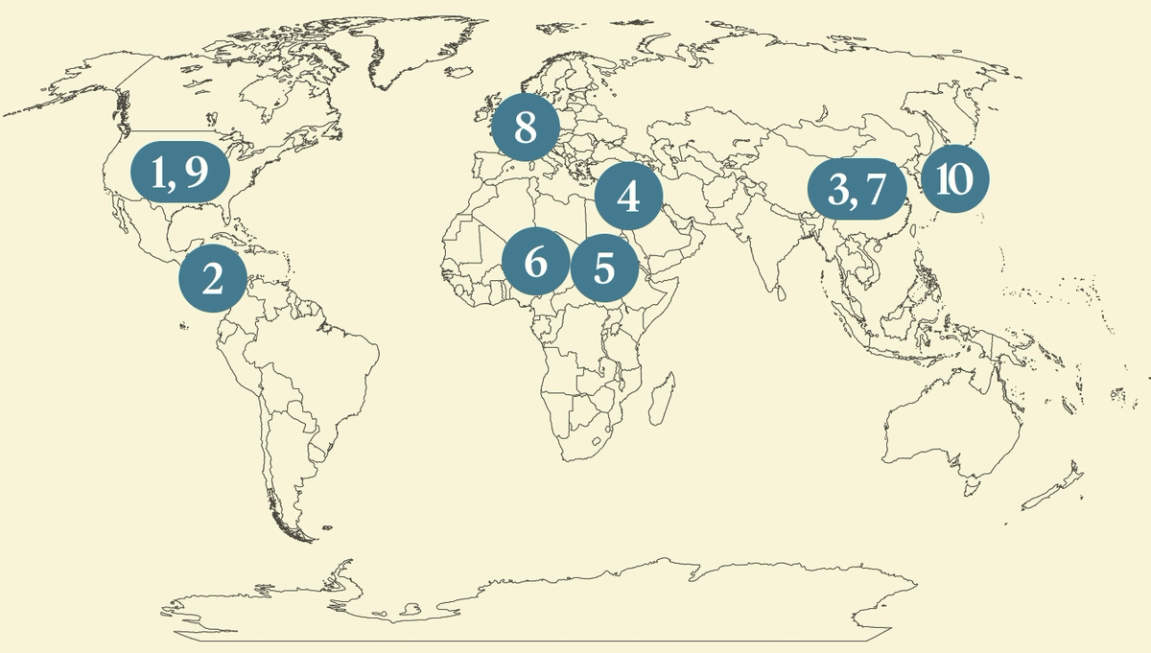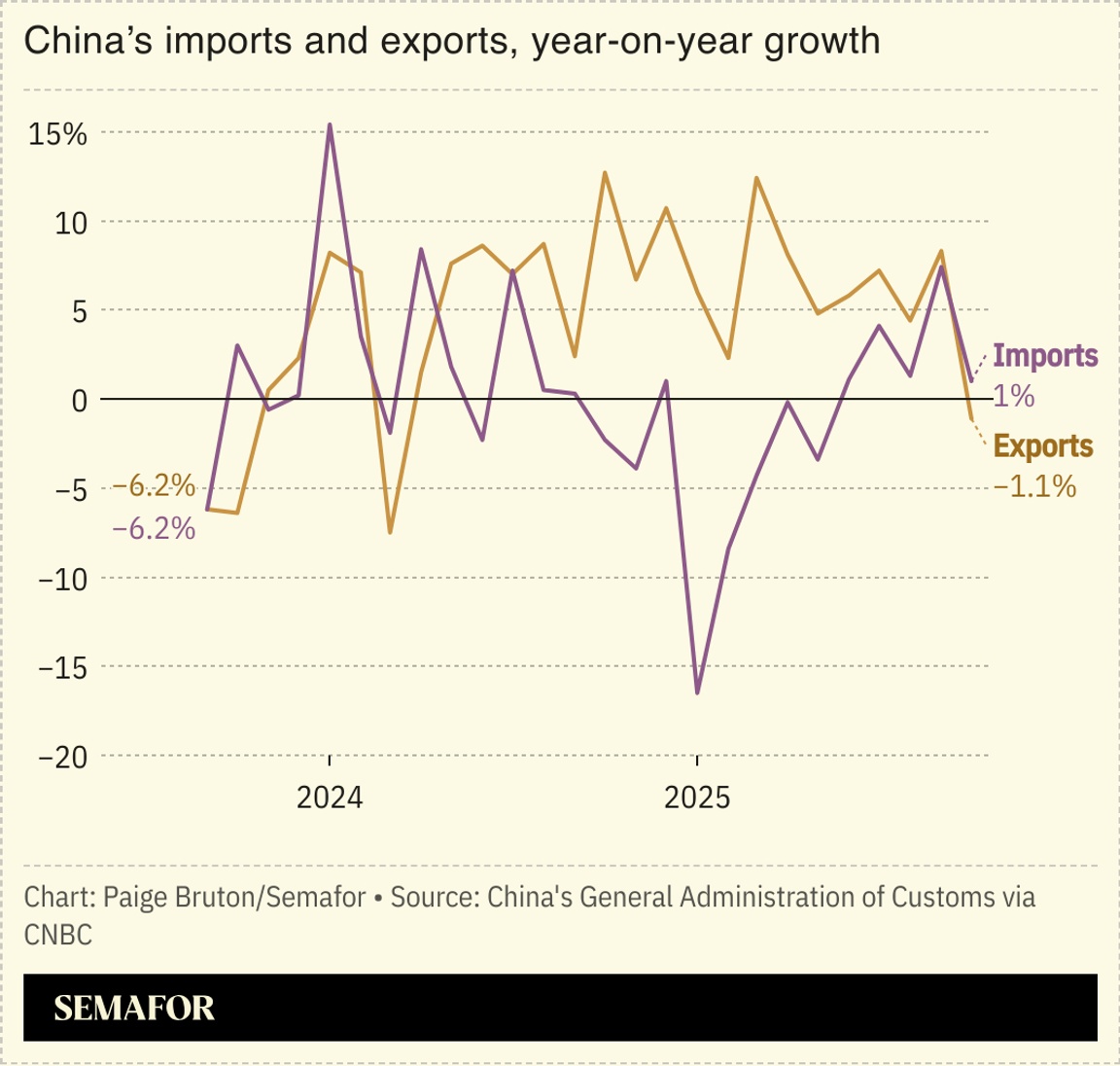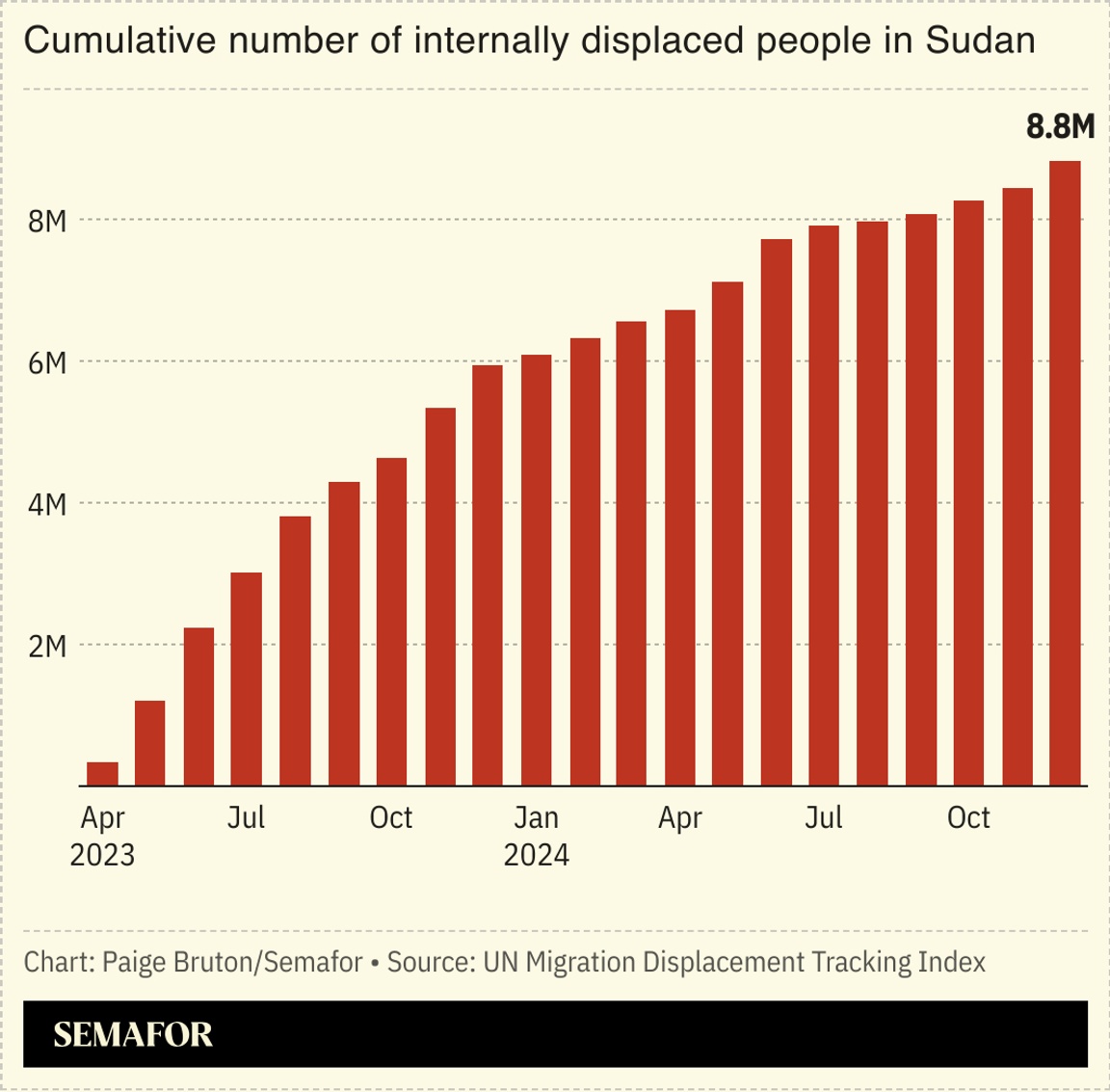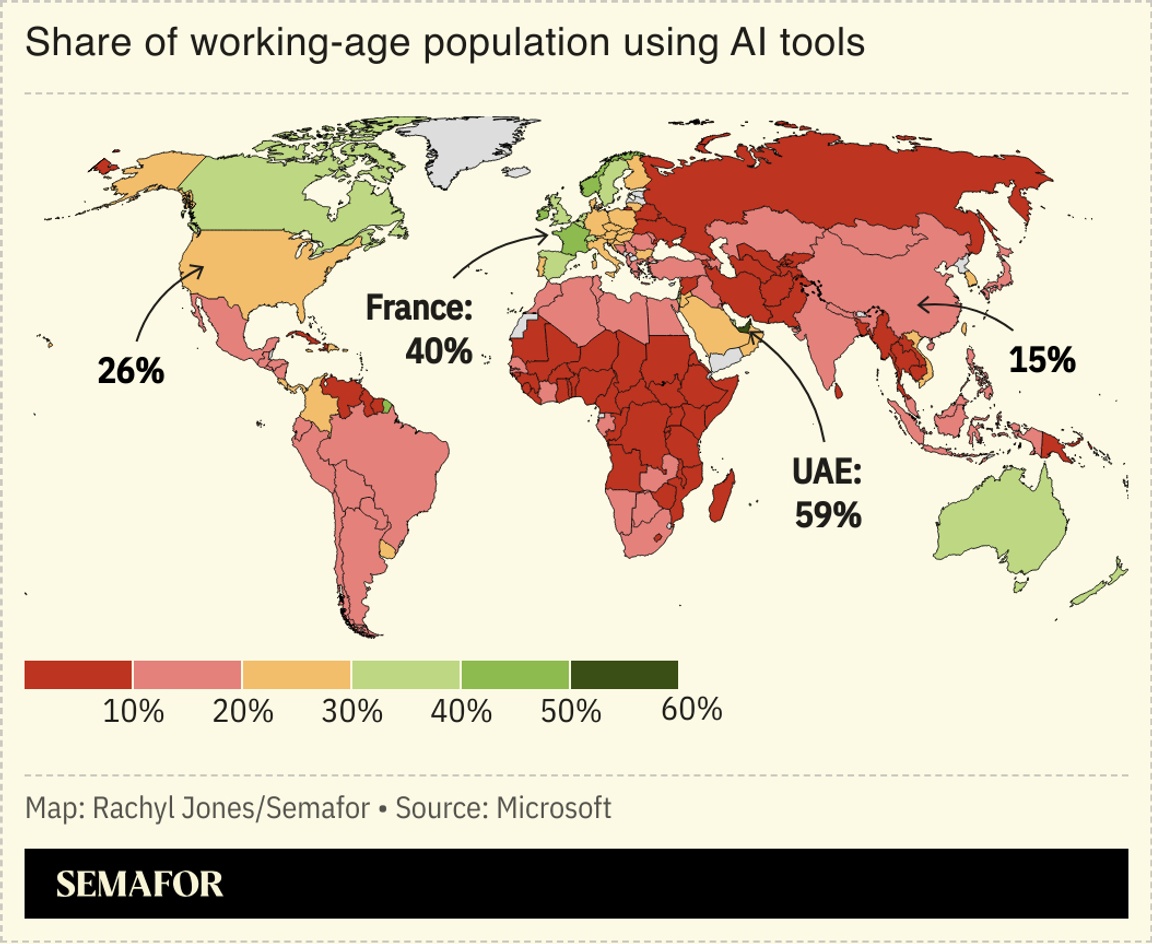| | No end in sight for the US government shutdown, Israel steps up strikes on Lebanon, and an AI that c͏ ͏ ͏ ͏ ͏ ͏ |
| |   Beirut Beirut |   San Salvador San Salvador |   El-Fasher El-Fasher |
 | Flagship |  |
| |
|
The World Today |  - Dems hold line on shutdown
- US buildup in Caribbean
- Chinese exports fall
- Israel strikes Lebanon
- RSF accepts Sudan truce
- Niger uranium deal
- China’s new aircraft carrier
- Science fraud fears
- Rise of AI ‘luddism’
- Mind-captioning AI
 A ‘bludgeoning’ new record from an LA producer. |
|
Dim hopes for ending US shutdown |
 US Senate Majority Leader John Thune. Annabelle Gordon/Reuters. US Senate Majority Leader John Thune. Annabelle Gordon/Reuters.US Democrats appeared ready to dig in their heels in the ongoing fight over the government shutdown. Lawmakers in the Senate said they would maintain a unified position, suggesting the shutdown will continue past its current, already record-breaking, 37 days, Semafor reported. Its impacts are starting to be felt beyond Washington: Flights are expected to be cut at 40 major airports, just before Thanksgiving, and food stamps have been delayed for millions. The true effects are hard to detect because crucial federal economic data has been turned off, delaying the official October jobs report, although private data suggests widespread layoffs. Republicans told Semafor’s politics team that they wanted President Donald Trump to focus on the economy, rather than foreign policy. |
|
US boosts Caribbean military buildup |
 US Navy’s USS Gerald R. Ford, the world’s largest aircraft carrier. NTB/Lise Aaserud via Reuters. US Navy’s USS Gerald R. Ford, the world’s largest aircraft carrier. NTB/Lise Aaserud via Reuters.At least three US military aircraft, including an armed attack plane, reportedly began flying missions out of El Salvador, as Washington boosts its defense buildup in the Caribbean despite growing opposition back home. About 10,000 US troops and a dozen warships are in the region and have carried out deadly strikes on alleged drug boats linked to Venezuela. El Salvador’s president is an ally of US President Donald Trump, and the US military maintains an outpost at El Salvador’s main airport, The New York Times reported. A bipartisan group of US senators attempted to limit Trump’s military orders against Venezuela, but were voted down: “We should not be going to war without a vote of Congress,” one Democrat said. |
|
Chinese exports fall unexpectedly |
 Chinese exports fell for the first time since the US imposed its “Liberation Day” tariffs in April. Exports had boomed this year, and economists had projected another month of growth, with declining trade with the US offset by increased shipments to the rest of the world. But falling prices, particularly for some of China’s most important exports such as batteries, cars, and solar panels, meant the value of exports fell 1.1% in October year-on-year, although the physical volume of exports has continued to increase. A recent trade truce with the US is expected to further boost exports, which Beijing is particularly reliant on as the Chinese economy struggles with a property slowdown, high youth unemployment, and weak consumer confidence. |
|
Israel steps up Lebanon strikes |
 Ali Hankir/Reuters Ali Hankir/ReutersIsrael stepped up air strikes on southern Lebanon, raising fears that the year-long truce with Hezbollah could collapse. The two sides fought a brief but vicious ground war last year, in the wake of Hamas’ Oct. 7, 2023 attacks on Israel, until a US-mediated truce in November. But Israel has carried out regular cross-border attacks, and Prime Minister Benjamin Netanyahu has said that Hezbollah is rearming, threatening to intensify strikes if Beirut does not do more to stop the group. The latest strikes killed at least one person. Israel’s truce with Hamas, brokered by US President Donald Trump, appears to be holding, and for the first time the militant group has indicated that it was prepared to partially disarm. |
|
Sudan militia agrees to ceasefire |
 The Sudanese Rapid Support Forces militia agreed to a ceasefire after years of fighting that has left 150,000 dead and sparked a humanitarian disaster. The military-led government in Khartoum has yet to respond to the US-backed ceasefire, a potential reprieve from the civil war that broke out in April 2023. Around 24 million people are facing acute food shortages, and famine has been declared in el-Fasher, seized by RSF rebels who are accused of mass killings in the stronghold. The proposal involves a three-month cessation of hostilities followed by a permanent ceasefire and return to civilian rule, but a Sudanese ambassador told the BBC the government would only accept the truce if the RSF was dismantled and disarmed. |
|
Russia buys Nigerien uranium |
 Gleb Garanich/Reuters Gleb Garanich/ReutersRussia could buy 1,000 metric tons of uranium from Niger, French security services said, a $170 million deal which raises the risk of theft by jihadi groups. The Arlit mine, formerly run by a French group, was seized during Niger’s 2023 military coup, and French troops were forced to leave. Stockpiles of uranium remained on site, and Niamey and the Russian nuclear energy giant Rosatom are working to transport it to Russia, Le Monde reported. The route would travel through Burkina Faso, much of which is under jihadist control. A series of coups in its former colonies has reduced France’s influence in the Sahel, while Russia has expanded its operations in the region by partnering with the military juntas. |
|
 A model of The Fujian aircraft carrier at an airshow in China. Tingshu Wang/File Photo/Reuters. A model of The Fujian aircraft carrier at an airshow in China. Tingshu Wang/File Photo/Reuters.China’s largest and most sophisticated aircraft carrier entered active service, the latest sign of Beijing’s growing naval might. The Fujian is China’s third carrier, and the first to be designed and built domestically: The others are based on Soviet models. Leader Xi Jinping has pushed to modernize the military, particularly the navy, to challenge US dominance in the South China Sea and assert sovereignty claims over Taiwan. Chinese warships now outnumber US ones, although the US operates more aircraft carriers, which are vital ways of projecting power overseas. The Fujian is smaller than its US counterparts, carries fewer aircraft, and is conventionally powered, while all 11 US carriers are nuclear and can sail for up to 20 years without refueling. |
|
Medical research red flags |
 Researchers found that 40% of academic papers they examined contained duplicated images, strong evidence of scientific fraud. The papers were studying strokes in animals, and researchers not only found duplicate images but also a lack of follow-up research, another red flag pointing to baseless findings. Duplicating images allows scientists to fabricate work they never did and suggest the evidence is stronger than it is. Such fraudulent science can slow medical progress and delay vital treatment, The Scientist reported, especially when, as in this case, journals rarely took steps to correct the record. Fake science is a growing problem as AI gathers pace: One recent analysis suggested 15% of all cancer research papers may be fraudulent. |
|
 Will Welch is the global director of GQ magazine and has been the editor-in-chief of its US operations since 2019. On this week’s Mixed Signals, Welch talks to Ben and Max about how the magazine plans to address men amid the growing prominence of the manosphere, the value in covering niche subcultures, and how the magazine’s parties operate as content creation mechanisms. Welch also talks about how he works with celebrities, praising Robert Pattinson as a more creative collaborator than he’s used to. Listen to the latest episode on Mixed Signals now. |
|
US states adopt AI disclosure law |
 The US states of Utah and California enacted laws requiring organizations to inform users when they are interacting with AI, amid growing opposition to the technology. The law will apply to online chats and will require California police to disclose the use of AI in incident reports. The White House is concerned about a growing patchwork of local rules, and tried unsuccessfully to block state-level regulation this year. But a backlash has emerged against AI and other tech principally by a Gen Z-led “Luddite Renaissance,” which eschews smartphones and AI-generated content, a CNN columnist noted. While AI becomes ubiquitous — robots are increasingly used in firefighting, law enforcement, and maintenance — there is a growing US push for laws to slow its uptake. |
|
|